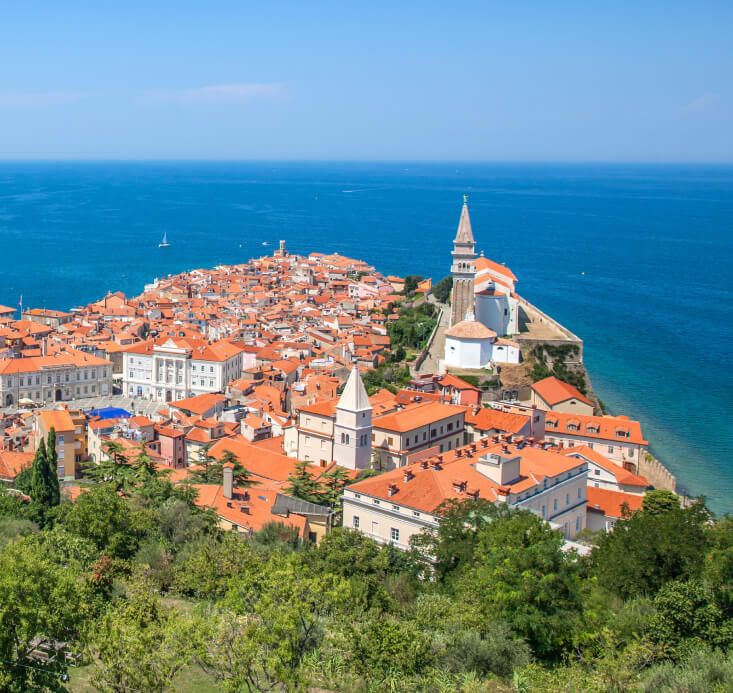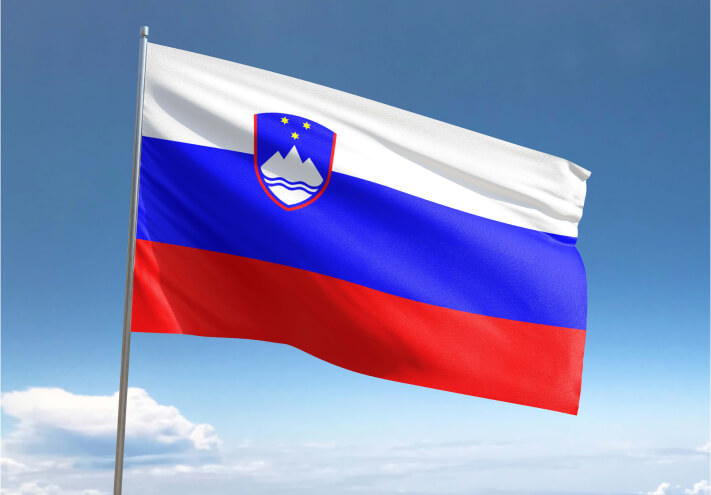Your quick guide on talent and labor compliance norms in Slovenia
Capital
Ljubljana
Currency
Euro (EUR)
Languages
Slovenian, English
Payroll Frequency
Monthly
GDP per Capita
$26,066.69
Employer Tax
16.10%
Talent Overview
Slovenia is located in Central Europe with the 32nd freest economy in the world and 22nd among the 45 countries in Europe. It has developed a 3% GDP growth over the years, partly thanks to its reliance on trade with the EU countries. The country is also the only one in Central Europe and Eastern Europe to have control over its banking sector.
Major economic hubs:
Ljubljana, Maribor, Celje
Skills in demand:
ICT Professionals, Education Professionals, Legal Professionals, Medical Professionals

Local Universities
The top local universities in Slovenia are as follows:




Salary Data
The table contains the average monthly salary in Slovenia:
| Job Title | Average Monthly Salary (in EUR) | Average Monthly Salary (in USD) |
| Information Technology Manager | 3,180.00 | 3,416.40 |
| Network Engineering Manager | 2,010.00 | 2,159.42 |
| Developer / Programmer | 1,810.00 | 1,944.56 |
| Project Manager | 2,100.00 | 2,256.11 |
| Database Administrator | 1,890.00 | 2,030.50 |
| Business Analyst | 2,300.00 | 2,470.98 |
| Business Development Manager | 2,800.00 | 3,008.15 |

Talent Sourcing Tips
426,000
Hiring in Slovenia requires you to be aware of the local employment laws, benefits, payroll, and taxes. Given below is everything you need to know on how to successfully onboard talents from Slovenia.
The language for the contract is not mandatory to be in the local language; however, the labour law requires a Slovenian version for it to be recognized as legitimately binding.
The probationary period for new employees ranges from 1 to 6 months.
| Date | Name | Type |
| 1 Jan | New Year’s Day | National holiday |
| 2 Jan | New Year holiday | National holiday |
| 8 Feb | Prešeren Day | National holiday |
| 9 Apr | Easter Sunday | National holiday |
| 10 Apr | Easter Monday | National holiday |
| 27 Apr | Day of Uprising Against Occupation | National holiday |
| 1 May | Labor Day / May Day | National holiday |
| 2 May | Labour Day holiday | National holiday |
| 28 May | Whit Sunday | National holiday |
| 25 Jun | Statehood Day | National holiday |
| 15 Aug | Assumption of Mary | National holiday |
| 31 Oct | Reformation Day | National holiday |
| 1 Nov | Remembrance Day | National holiday |
| 25 Dec | Christmas Day | National holiday |
| 26 Dec | Independence and Unity Day | National holiday |
| Type of leave | Time period | Mandatory |
| Annual leave/Earned Leave | 2 weeks | Yes |
| Maternity Leave | 130 days | Yes |
| Sick Leave | Up to 30 days | No |
Payroll
Payroll Cycle
Workers are paid monthly.
Minimum Wage
The minimum wage in Slovenia is EUR 1,074.43 per month.
Overtime Pay
Overtime pay in Slovenia must have a written form to be given advanced to employees. The overtime work limit is 8 hours per week and 170 hours per year which can be extended 230 hours.
Bonus
The 13th-month pay is customary in Slovenia.
Taxes
| Contribution | Rate (%) |
| Pension and Disability Insurance | 8.85 |
| Health Insurance | 6.56 |
| Unemployment Insurance | 0.06 |
| Injury at Work | 0.53 |
| Parental Insurance | 0.10 |
| Contribution | Rate (%) |
| Pension and Disability Insurance | 15.50 |
| Health Insurance | 6.36 |
| Unemployment Insurance | 0.14 |
| Parental Insurance | 0.10 |
| Taxable Base (EUR) | Tax on Column 1 (EUR) | Tax on Excess (%) |
| 0 – 8,755.00 | 0 | 16 |
| 8,755.01 – 25,750.00 | 1,400.80 | 26 |
| 25,750.01 – 51,500.00 | 5,819.50 | 33 |
| 51,500.01 – 74, 160.00 | 14,317.00 | 39 |
| 74, 160.01 and above | 23,154.40 | 45 |
The standard VAT in Slovenia is 22%.
Offboarding & Termination
Employers must provide written notice for terminating employees specifying valid reasons under the labour code. Failure to do so is illegal and may be subject to fines and legal action.
Prior to termination, employees are entitled to defend the reasons for incapacity within a reasonable deadline. If the worker is in a union, the employee may request the employer to notify the union in writing.
The notice period for probationary and regular employees ranges from 15 – 60 days.
The severance pay in Slovenia depends on the tenure of employment.
Visa and Immigration
Applying for a business visa to Slovenia is under the Schengen requirements of the European Union. Travellers must have the following documents ready for application.

Overtime pay in Slovenia must have a written form to be given advanced to employees. The overtime work limit is 8 hours per week and 170 hours per year which can be extended 230 hours.
Overtime pay should be at least 125% of the regular rate.
For night work, the usual rate is 175% of the regular rate. For holiday and weekend work, the rate is 200%.